New Yorker Reflects On Whether Prioritizing Your Dog's Comfort Over Social Niceties Is Practical Or Rude
Social interactions with strangers in bustling cities present challenges, especially when personal circumstances influence how one handles these encounters. In vibrant urban environments, where people and situations are constantly in flux, the social dynamics can become quite complex and overwhelming.
Consider the case of a man with a reactive dog living in a busy city like New York. He prefers not to stop in the street if approached by strangers seeking directions or initiating conversation. This preference helps avoid triggering any stress in his dog, which could easily be upset by such interruptions.
When seeking advice from others, he was reassured that prioritizing his dog’s well-being is not considered rude. He was told that he is not obliged to engage with strangers if it disrupts his dog's comfort and that he can ignore people he prefers not to interact with.
Now, he questions whether this approach should be applied to all social situations, such as encounters in his building’s elevator. The decision to avoid conversations with strangers while walking his dog seems straightforward, but living in a city like New York may add layers of complexity to this decision.
He is receiving mixed feedback about his behavior. While some view his actions as perfectly reasonable, others, including his mother, interpret his behavior as impolite. This has led him to reconsider whether continuing to ignore strangers is considered rude or simply a practical approach to managing his dog's reactions.
OP has a reactive dog, so he prefers walking when strangers approach him to avoid upsetting his pet in the city.

People told him it's not rude to ignore strangers he doesn't want to interact with and that he doesn’t owe them his time.

Social Dynamics and Dog Ownership
Research from the field of social psychology indicates that owning a pet, particularly a dog, can significantly influence social interactions. A study published in the Journal of Social Psychology found that dog owners are often perceived more positively than non-owners, increasing their likelihood of social engagement.
This perception can lead to unique challenges for individuals with reactive dogs, as they may feel torn between protecting their pet and engaging in social niceties. Balancing these needs is crucial for both the owner and their dog’s well-being.
OP doesn't want to talk even with people in his building's elevator or elsewhere...

OP is confused because his mom says he is rude for ignoring strangers.

The Importance of Empathy in Social Situations
Empathy plays a vital role in social interactions, particularly in urban environments where misunderstandings can arise. Studies have shown that cultivating empathy enhances social cohesion, even among strangers.
A research article in the Journal of Personality and Social Psychology highlights that empathetic responses can diffuse tension, making interactions smoother. For dog owners, expressing understanding toward others’ reactions and sharing their own challenges can foster connection and mutual respect, ultimately benefiting everyone involved.
In NYC, you don’t have to engage with everyone but should offer a brief, polite response, like a quick “Sorry,” especially in shared spaces.
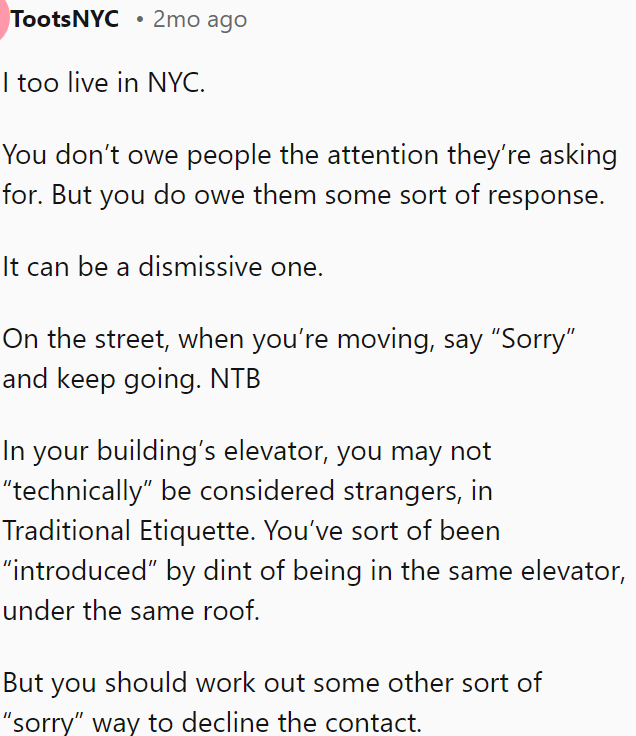
Ignoring people might lead them to think poorly of you.
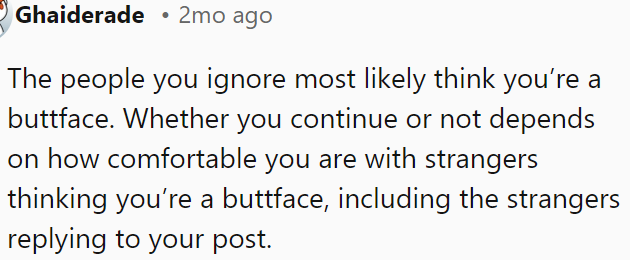
Exploring the Dog-Human Bond
Dr. Karen Allen, a behavioral psychologist, emphasizes the significance of the human-animal bond and how it can sometimes lead to complex social dilemmas.
Her research indicates that prioritizing a pet's comfort can reflect deeper values regarding empathy and care, which may conflict with social expectations.
This phenomenon is particularly pronounced in urban environments where social niceties are often prioritized over personal preferences.
Due to the city's culture, ignoring people is more natural and fitting in NYC than engaging in conversation.
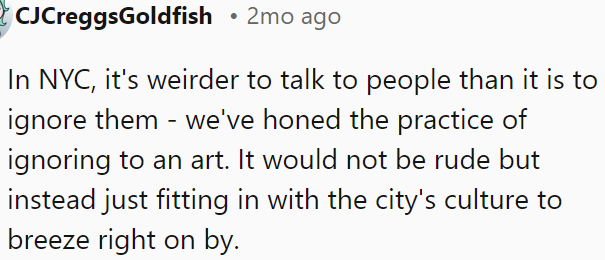
To avoid street conversations, OP can wear visible wired earbuds (unplugged) and smile and nod if approached, using the earbuds as an excuse.
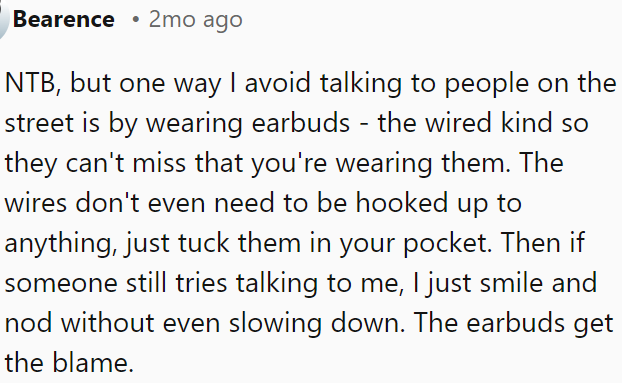
Clinical psychologists emphasize the importance of social context in shaping behavior. In bustling urban environments, the pressures of social expectations can create anxiety, particularly for those managing a reactive dog.
Research published in the Journal of Anxiety Disorders shows that anxiety can heighten reactivity in both dogs and their owners. Understanding this can empower owners to approach social situations more mindfully, fostering a less stressful experience for both parties.
People won’t remember or care if someone doesn’t stop to chat.
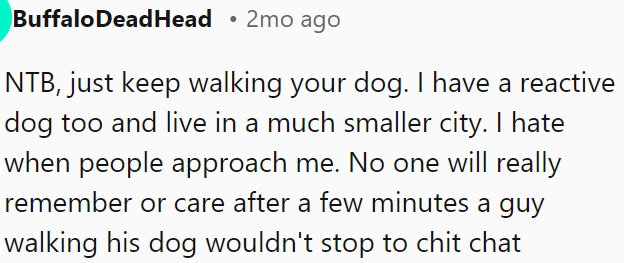
If his dog is anxious, the OP should put a sticker on its leash or harness indicating "Do Not Approach," and it's okay to ignore people who still try to interact.
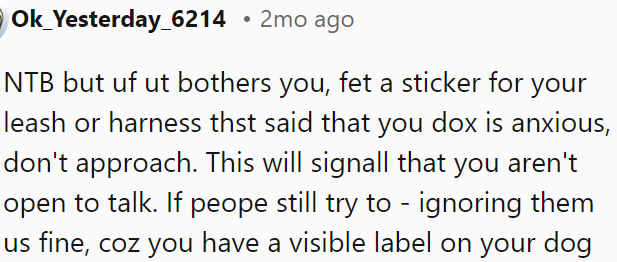
Social psychologists have studied how our relationships with pets can affect our interactions with people. A study published in the Journal of Social Psychology found that those who prioritize animal comfort often exhibit higher levels of empathy and social responsibility.
However, this can sometimes be perceived as socially inappropriate, creating a conflict between personal values and societal norms.
Basic politeness on the sidewalk is enough.
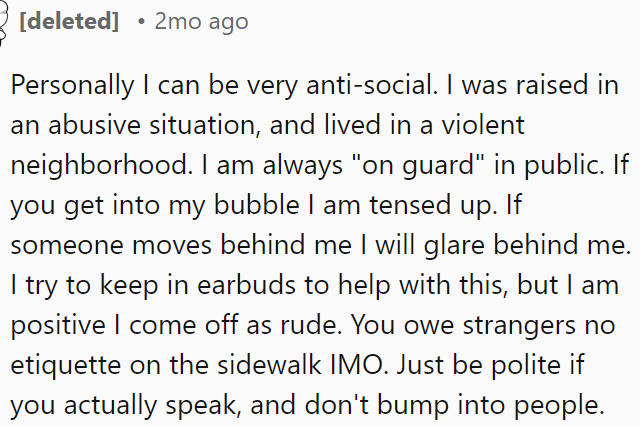
OP should avoid eye contact and keep moving.

Practical Strategies for Managing Social Interactions
Experts recommend employing specific strategies to balance personal comfort and social niceties. One effective approach is to practice assertive communication, allowing dog owners to express boundaries without feeling rude.
According to research from the University of Michigan, assertiveness training can significantly reduce anxiety in social situations. Additionally, using calming techniques, such as deep breathing, can help owners feel more at ease during potentially stressful interactions, ensuring they prioritize their dog's comfort without compromising their own social needs.
Psychological Analysis
This scenario illustrates the tension between personal values and societal norms. The man's desire to prioritize his dog's comfort over social niceties reflects a high level of empathy and care, which is often seen in strong human-animal bonds. However, it's also causing confusion and potential conflict as it bucks social expectations, particularly in urban environments where engaging with strangers is common.
Analysis generated by AI
The Role of Social Expectations
In many cases, the pressure to conform to social norms can create feelings of guilt or defensiveness when one's priorities differ from the majority.
Understanding the social context in which these choices are made is crucial, as it can help individuals navigate their relationships with both pets and people.
Open discussions about values can foster understanding and acceptance among peers, reducing the likelihood of conflict.
A developmental psychologist notes that early social experiences shape how individuals navigate relationships. Children who witness positive interactions between pets and people often develop empathy and social skills.
However, the stress of managing a reactive dog may hinder these experiences. Research from the American Psychological Association suggests that fostering positive encounters can enhance both the owner’s and dog’s social adaptability, promoting a healthier dynamic in urban settings.
Moreover, finding a balance between pet care and social interactions can involve practical strategies. For instance, setting boundaries about when and how to prioritize pet needs can help mitigate feelings of rudeness.
This might include scheduling playdates or outings that accommodate both social and pet needs, allowing for shared experiences that enhance relationships.
Building Healthier Patterns
In navigating the complexities of urban social dynamics while managing a reactive dog, understanding the psychological underpinnings of these interactions can be beneficial. Research indicates that fostering emotional intelligence and assertiveness can enhance social experiences for both the owner and their pet.
By prioritizing empathy and employing effective communication strategies, individuals can create a balance that respects their dog’s needs while engaging positively with others, ultimately enriching their social lives and promoting well-being.



